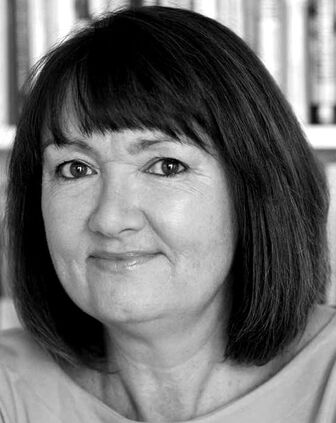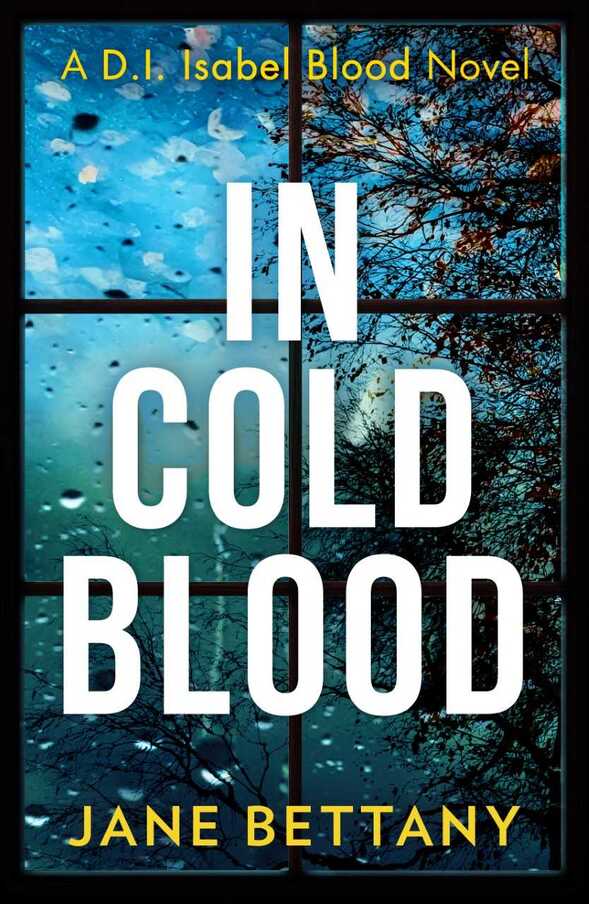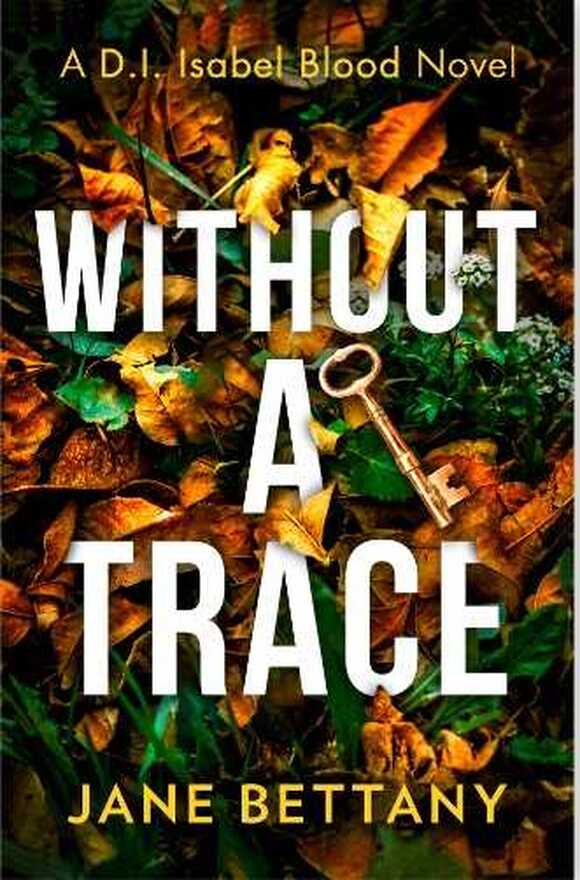
It gives me great pleasure to welcome Jane Bettany onto the website today. Jane's debut crime novel In Cold Blood was the winner of the 2019 Gransnet and HQ Writing Competition and is published by HQ (Harper Collins). Her second novel Without a Trace is released on 29 October.
Alex: Tell us a bit about yourself, Jane.
Jane: I was born near Derby, and have lived in Derbyshire for most of my life. I spent my childhood in Belper, eight miles north of Derby, and I still visit the town regularly. It was there, at the age of six, that I joined the local library and I’ve been an avid reader ever since. I think my desire to write developed from my love of books.
My journey as a writer has been a long and gradual one. For many years I wrote short stories for magazines, but it wasn’t until I was in my fifties that I finished my first novel. I’ve always adored reading crime fiction, so it seemed like the obvious genre to choose as a novelist. I suppose I try to write the kind of books I would enjoy reading myself.
Alex: Tell us a bit about yourself, Jane.
Jane: I was born near Derby, and have lived in Derbyshire for most of my life. I spent my childhood in Belper, eight miles north of Derby, and I still visit the town regularly. It was there, at the age of six, that I joined the local library and I’ve been an avid reader ever since. I think my desire to write developed from my love of books.
My journey as a writer has been a long and gradual one. For many years I wrote short stories for magazines, but it wasn’t until I was in my fifties that I finished my first novel. I’ve always adored reading crime fiction, so it seemed like the obvious genre to choose as a novelist. I suppose I try to write the kind of books I would enjoy reading myself.

Alex: How would you describe your writing, and are there particular themes that you like to explore?
Jane: ‘Family’ is a theme that occurs frequently in my writing. Families can be complicated and not all relationships are what they might seem. These complex connections can make for interesting storylines.
Alex: Are you a writer that plans a detailed synopsis or do you set out with a vague idea and let the story unfold as you write?
Jane: I am neither a plotter, nor a pantser. I'm more of a mixture of the two (a plotser?)! In other words, I do develop a brief plan before I start to write, but it’s never more than an outline (usually a two-page synopsis). Once I’ve done that, I plan the first three chapters in more detail to get myself off to a flying start. Once the first few chapters are written, I then go with the flow and see where the story takes me.
As I write, I refer back to my synopsis to keep my novel roughly on track in terms of the story’s ‘road map’.
Alex: Tell us about your latest novel
Jane: My latest crime novel, Without a Trace, will be published by HQ Harper Collins on 29 October 2021 as an eBook, and in paperback and audio book on 6 January 2022. It’s the second book in the DI Isabel Blood series.
The blurb for Without a Trace…
When Ruth Prendergast arrives home after a long day at work, she finds a dead man, lying in her bed – a knife buried in his chest.
When Detective Inspector Isabel Blood and her sergeant arrive on the scene, Ruth claims she’s never laid eyes on the victim before. But with no sign of a break-in, how did the killer gain access to the house?
Then Ruth disappears, leaving Isabel and her team to fear the worst. Has their lead suspect escaped, or is Ruth in danger herself?
Forensic evidence at the crime scene is sparse, and it’s proving impossible for Isabel to make a breakthrough. With Ruth still missing, time is running out.
But how can you catch a killer that doesn’t leave a trace?
Jane: ‘Family’ is a theme that occurs frequently in my writing. Families can be complicated and not all relationships are what they might seem. These complex connections can make for interesting storylines.
Alex: Are you a writer that plans a detailed synopsis or do you set out with a vague idea and let the story unfold as you write?
Jane: I am neither a plotter, nor a pantser. I'm more of a mixture of the two (a plotser?)! In other words, I do develop a brief plan before I start to write, but it’s never more than an outline (usually a two-page synopsis). Once I’ve done that, I plan the first three chapters in more detail to get myself off to a flying start. Once the first few chapters are written, I then go with the flow and see where the story takes me.
As I write, I refer back to my synopsis to keep my novel roughly on track in terms of the story’s ‘road map’.
Alex: Tell us about your latest novel
Jane: My latest crime novel, Without a Trace, will be published by HQ Harper Collins on 29 October 2021 as an eBook, and in paperback and audio book on 6 January 2022. It’s the second book in the DI Isabel Blood series.
The blurb for Without a Trace…
When Ruth Prendergast arrives home after a long day at work, she finds a dead man, lying in her bed – a knife buried in his chest.
When Detective Inspector Isabel Blood and her sergeant arrive on the scene, Ruth claims she’s never laid eyes on the victim before. But with no sign of a break-in, how did the killer gain access to the house?
Then Ruth disappears, leaving Isabel and her team to fear the worst. Has their lead suspect escaped, or is Ruth in danger herself?
Forensic evidence at the crime scene is sparse, and it’s proving impossible for Isabel to make a breakthrough. With Ruth still missing, time is running out.
But how can you catch a killer that doesn’t leave a trace?

Alex: What was the first book you read?
Jane: I couldn’t wait to start school so that I could learn to read, and I remember being given a copy of Chicken Licken in my first reading lesson.
The first 'proper' books I read were the Beatrix Potter series, which I borrowed from the library. I loved reading about the adventures of Peter Rabbit, Mrs Tiggywinkle, Tom Kitten and Squirrel Nutkin.
Alex: How much research do you do and what does it usually entail?
Jane: My novels are set in Derbyshire, in the fictional town of Bainbridge (which is loosely based on Belper, where I grew up). It’s relatively easy writing about your own stomping ground, so in terms of ‘setting’, I don’t need to do much research.
Most of my research relates to police procedures and forensics. I don’t have a legal or police background, so I’ve had to learn how the police force works. I’ve done some of my own research online, and I also have several useful writing reference books on forensic science and police procedures, which have been written specifically for crime authors.
If I’m stuck on something, or need more guidance on a specific point of law, I ask former senior police detective, Stuart Gibbon, who runs the Gib Consultancy for writers.
Alex: Do you ever base your characters on people you have encountered in real life?
Jane: I’ve never knowingly based a character on a real person, but I have used certain elements of people I’ve met and woven them into my stories. Writers love to people-watch and store away the things they see for future reference. These physical appearances, mannerisms, habits, or someone’s way of speaking all help to bring fictional characters to life.
Alex: Which was the last book you read that blew you away?
Jane: I recently read A Good Girl’s Guide to Murder by Holly Jackson. It’s a young adult crime thriller featuring Pippa Fitz-Amobi, a schoolgirl who is investigating the disappearance of Andie Bell five years earlier. I absolutely loved the characters in this book, but what really blew me away was the innovative narrative techniques used by the author. As Pippa is investigating the case for her school project, parts of the story are told through the transcripts of her interviews and project reports.
Alex: What are your interests aside from writing? And what do you do to unwind?
Jane: My favourite ways to unwind are: walking my dog; eating out; drinking strong coffee; drinking red wine; reading a good book. I also love to travel and enjoy exploring new places.
Alex: Which authors do you particularly admire and why?
Jane: As a reader, I enjoy the work of a diverse range of authors, but my favourites in the crime genre are Ann Cleeves and Elly Griffiths, who deliver clever plots, a strong sense of place, and stand-out characters.
Alex: Thank you so much for sharing your writing journey with us, Jane, and good luck with your new book. I'll keep an eye out for it.
Jane: Thank you Alex. It's been a great pleasure.
Jane: I couldn’t wait to start school so that I could learn to read, and I remember being given a copy of Chicken Licken in my first reading lesson.
The first 'proper' books I read were the Beatrix Potter series, which I borrowed from the library. I loved reading about the adventures of Peter Rabbit, Mrs Tiggywinkle, Tom Kitten and Squirrel Nutkin.
Alex: How much research do you do and what does it usually entail?
Jane: My novels are set in Derbyshire, in the fictional town of Bainbridge (which is loosely based on Belper, where I grew up). It’s relatively easy writing about your own stomping ground, so in terms of ‘setting’, I don’t need to do much research.
Most of my research relates to police procedures and forensics. I don’t have a legal or police background, so I’ve had to learn how the police force works. I’ve done some of my own research online, and I also have several useful writing reference books on forensic science and police procedures, which have been written specifically for crime authors.
If I’m stuck on something, or need more guidance on a specific point of law, I ask former senior police detective, Stuart Gibbon, who runs the Gib Consultancy for writers.
Alex: Do you ever base your characters on people you have encountered in real life?
Jane: I’ve never knowingly based a character on a real person, but I have used certain elements of people I’ve met and woven them into my stories. Writers love to people-watch and store away the things they see for future reference. These physical appearances, mannerisms, habits, or someone’s way of speaking all help to bring fictional characters to life.
Alex: Which was the last book you read that blew you away?
Jane: I recently read A Good Girl’s Guide to Murder by Holly Jackson. It’s a young adult crime thriller featuring Pippa Fitz-Amobi, a schoolgirl who is investigating the disappearance of Andie Bell five years earlier. I absolutely loved the characters in this book, but what really blew me away was the innovative narrative techniques used by the author. As Pippa is investigating the case for her school project, parts of the story are told through the transcripts of her interviews and project reports.
Alex: What are your interests aside from writing? And what do you do to unwind?
Jane: My favourite ways to unwind are: walking my dog; eating out; drinking strong coffee; drinking red wine; reading a good book. I also love to travel and enjoy exploring new places.
Alex: Which authors do you particularly admire and why?
Jane: As a reader, I enjoy the work of a diverse range of authors, but my favourites in the crime genre are Ann Cleeves and Elly Griffiths, who deliver clever plots, a strong sense of place, and stand-out characters.
Alex: Thank you so much for sharing your writing journey with us, Jane, and good luck with your new book. I'll keep an eye out for it.
Jane: Thank you Alex. It's been a great pleasure.
